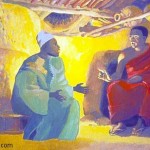 6th Sunday in Eastertide – Year B
6th Sunday in Eastertide – Year B
Love one another, as I have loved you (Jn 15:12)
From the Golden Rule to a Programme of Life
Many Diocesan Catechisms, after listing the Ten Commandments would immediately add, “And these can be summarised in two Commandments:
‘You must love the Lord your God with all your heart, with all your soul, and with all your mind’ (from Deuteronomy 6:5), and
‘You must love your neighbour as yourself’” (from Leviticus 19:18).
The official Catechism of the Catholic Church (1993) does not add this appendage, but it groups the Ten Commandments in two sections using the two quotations (from Deuteronomy and Leviticus) referring to the Love of God and the Love of Neighbour as titles for the two groups. For the purposes of teaching it is useful to group the Ten Commandments in the two tablets of Moses: the […]
 The Maasai people ofEast Africaare a very interesting people. Their photogenic, elegant figures are used to advertise tourism inEast Africa. But traditionally they were known for raiding the neighbouring tribes, and taking possession of their cattle. At least, so goes the legend! From these accounts one might think that the Maasai are a very violent people. There is a mythical background, however, to why the Maasai raid the other tribes that have cows. It is said that, in the beginning when God created the world… He created all the animals, and especially the cows. Then He also created human beings – the Maasai, of course. Then God entrusted the Maasai with all the cows in the world. Therefore all the cows in the world […]
The Maasai people ofEast Africaare a very interesting people. Their photogenic, elegant figures are used to advertise tourism inEast Africa. But traditionally they were known for raiding the neighbouring tribes, and taking possession of their cattle. At least, so goes the legend! From these accounts one might think that the Maasai are a very violent people. There is a mythical background, however, to why the Maasai raid the other tribes that have cows. It is said that, in the beginning when God created the world… He created all the animals, and especially the cows. Then He also created human beings – the Maasai, of course. Then God entrusted the Maasai with all the cows in the world. Therefore all the cows in the world […] 3rd Sunday of Easter – Year B
3rd Sunday of Easter – Year B We want to see Jesus lifted high
We want to see Jesus lifted high “God loved the world so much….”
“God loved the world so much….”